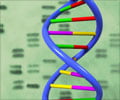A new ultrasensitive electronic sensor that would speed up DNA testing for disease diagnosis and biological research has been developed by scientists at Singapore.
A new ultrasensitive electronic sensor that would speed up DNA testing for disease diagnosis and biological research has been developed by scientists at Singapore.
The novel electronic sensor array would be rapid, accurate and cost-efficient.According to lead researcher Dr Zhiqiang Gao, from Singapore's Institute of Bioengineering and Nanotechnology (IBN), the Nanogap Sensor Array has shown "excellent" sensitivity at detecting trace amounts of DNA.
"By saving time and lowering expenses, our newly developed Nanogap Sensor Array offers a scalable and viable alternative for DNA testing," said Gao.
The biosensor translates the presence of DNA into an electrical signal for computer analysis.
The distinctively designed sensor chip has the ability to detect DNA more efficiently by "sandwiching" the DNA strands between the two different surfaces.
"The novel vertical nanostructure design and two different surfaces of the sensor allow ultrasensitive detection of DNA," said Gao.
Presently, human DNA is detected through the use of polymerase chain reaction (PCR), which while effective, is also expensive, cumbersome and time-consuming for widespread use.
The biosensor captures DNA strands more effectively. This is possible because the two surfaces of the sensor are coated with a chemically treated "capture probe" solution through an electrochemical technique specially developed by IBN.
This allows DNA strands to "stick" more easily to the sensor, resulting in a faster and more accurate analysis.
"This new biosensor holds significant promise to speed up on-going efforts in the detection and diagnosis of debilitating diseases such as cancer, cardiovascular problems and infectious viruses," said Dr Jackie Y. Ying, Executive Director of IBN, one of the research institutes of Singapore's Agency for Science, Technology and Research (A*STAR).
"We aim to make healthcare accessible to the masses with early disease diagnosis as the critical driving force behind the research we undertake here at IBN," he added.
The study appears in Journal of the American Chemical Society.
Source-ANI
RAS
 MEDINDIA
MEDINDIA




 Email
Email








